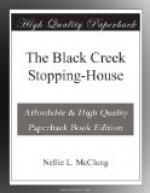Whatever the attitude of the audience was at first, they soon followed her with eager interest as she told them, in her easy way, simple stories of the people she knew so well and so lovingly understood. There was no art in the telling, only a sweet naturalness and an apparent honesty—the honesty of purpose that comes to people in lonely places. Her stories were all of the class that magazine editors call “homely, heart-interest stuff,” not deep or clever or problematical— the commonplace doings of common people—but it found an entrance into the hearts of men and women.
They found themselves looking with her at broad sunlit spaces, where struggling hearts work out noble destinies, without any thought of heroism. They saw the moonlight and its drifting shadows on the wheat, and smelled again the ripening grain at dawn. They heard the whirr of prairie chickens’ wings among the golden stubble on the hillside, and the glamor of some old forgotten afternoon stole over them. Men and women country-born who had forgotten the voices of their youth, heard them calling across the years, and heard them, too, with opened hearts and sudden tears. There was one pathetic story she told them, of the lonely prairie woman—the woman who wished she was back, the woman to whom the broad outlook and far horizon were terrible and full of fear. She told them how, at night, this lonely woman drew down the blinds and pinned them close to keep out the great white outside that stared at her through every chink with wide, pitiless eyes—the mocking voices that she heard behind her everywhere, day and night, whispering, mocking, plotting; and the awful shadows, black and terrible, that crouched behind her, just out of sight—never coming out in the open.
It was a weird and gloomy picture, that, but she did not leave it so. She told of the new neighbor who came to live near the lonely woman— the human companionship which drove the mocking voices away forever— the coming of the spring, when the world awoke from its white sleep and the thousand joyous living things that came into being at the touch of the good old sun!
At the reception after the programme, many crowded around her, expressing their sincere appreciation of her work. Bruce Edwards fully enjoyed the distinction which his former acquaintance with her gave him, and it was with quite an air of proprietorship that he introduced to her his friends.
Mrs. Trenton, Mrs. Banks and other members of the Arts and Crafts, at a distance discussed her with pride. She had made their open night a wonderful success—the papers would be full of it to-morrow.
“You can see how fitted she is for a life of culture,” said Miss Hastings, the oil painter; “her shapely white hands were made for silver spoons, and not for handling butter ladles. What a perfect joy it must be for her to associate with people who are her equals!”
“I wonder,” said Mrs. Banks, “what her rancher would say if he saw his handsome wife now. So much admiration from an old lover is not good for the peace of mind of even a serious-minded author—and such a fascinating man as Bruce! Look how well they look together! I wonder if she is mentally comparing her big, sunburned cattleman with Bruce, and thinking of what a different life she would have led if she had married him!”




